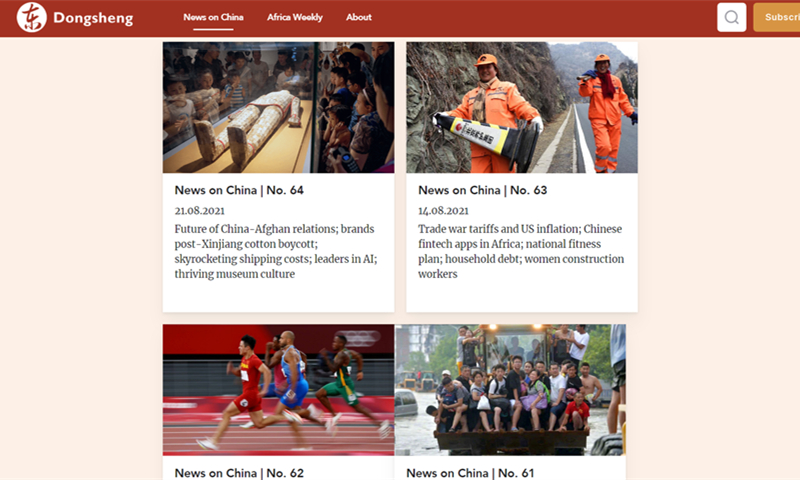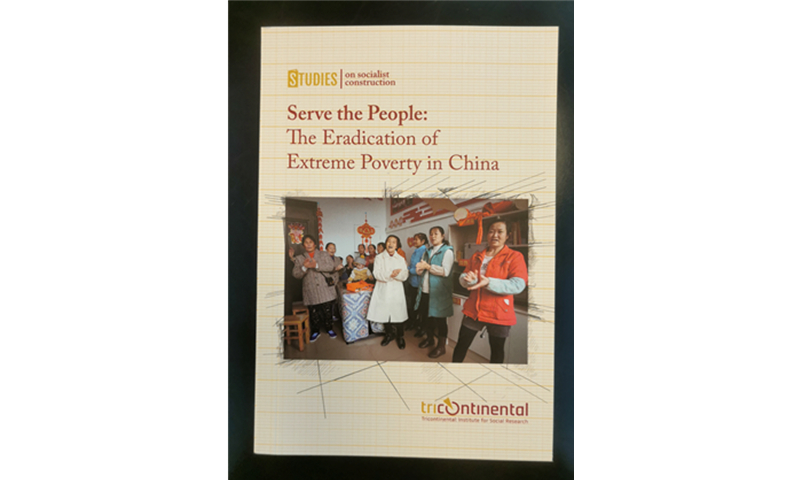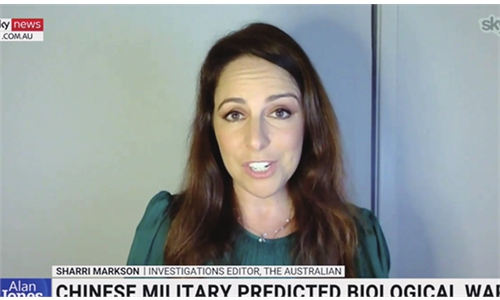Conveying the real China: international researchers share objective stories about China with foreign audiences

Screenshot of Dongsheng website
It's not always easy for overseas audiences to have access to true and comprehensive information on China, as some mainstream Western media cover China with lies and bias, and have dominated the global dissemination of news. Dongsheng - literally "eastern voices" - is a weekly news digest project created by a group of international researchers who are interested in Chinese politics and society, and try to improve this information imbalance dilemma.
Every Saturday, Dongsheng shares 10-12 news pieces about China on the "News on China" channel on its website and social media platforms, covering topics such as Chinese politics and economy, and the daily life of Chinese people.
With its target audience mainly nationals from the Global South, Dongsheng was created in the summer of 2020, when COVID-19 rumors and misinformation attacking China were most provocative. Back then, it was "almost impossible" to find reliable sources that brought [people in Global South] honest facts about China, Tings Chak, a main founder of Dongsheng, told the Global Times.
Eastern voices
To combat the information imbalance and share more real, objective stories about China with Global South readers, Chak and her coworkers created Dongsheng so that they could regularly collect and summarize China-related news stories in English, Spanish and Portuguese. Each week they share stories on their website and social media channels - they also email them to subscribers for free.
The stories shared by Dongsheng come from both Chinese official and nonofficial media, Chak said. "We also look at Western media," she added. "We need to be able to know what are the main narratives outside of China."
Chak estimated the project now covers some 1 million readers from all over the world, mostly from developing countries in the Global South such as Brazil, India and Nigeria, where people are curious about China's work in areas such as space exploration and anti-monopoly developments, but such topics are rarely covered in the comprehensive, unbiased way that they deserve.
China's poverty-reduction efforts - especially how it eliminated extreme poverty and fight the pandemic in the same year (2020) - is one of the most interesting topics for Global South audiences, Chak said.
Regarding China's poverty alleviation as "one of the greatest stories that needs to be shared with the Global South," Tricontinental: Institute for Social Research (Tricontinental), a Global South-focused research institute, published a booklet titled Serve the People: The Eradication of Extreme Poverty in China in July.
Tricontinental consists of more than 30 progressive researchers working in cities including Sao Paulo, Buenos Aires, Johannesburg and New Delhi, introduced Chak, who also works as a Tricontinental researcher.
Before publishing the booklet, Tricontinental researchers spent six months looking at information available in Chinese- and English-language media and academic sources, as well as talking to specialists and conducting field researches in villages and relocated communities in Southwest China's lesser-developed Guizhou Province.
The United Nations is committed to eradicating extreme poverty by 2030, but China reached this goal 10 years earlier, said Chak.
China is leading the way for the world, Chak told the Global Times. "It is not just providing a model for countries like Zambia or Bolivia; indeed, there are many inspirations and lessons about its methods, such as the theory for poverty alleviation, policy planning, and the role of a strong government and a strong party," she said.

Tricontinental: Institute for Social Research, a Global South-focused research institute, publishes a booklet telling China's poverty alleviation stories. (photo: coutersy of Tricontinental)
Breaking down information barriers
Despite China's positive contributions to the world, foreign audiences rarely get access to information about it, partly due to selective and imbalanced reporting by some Western media, Chak observed.
She used Robert Lawrence Kuhn, a US-based Public Broadcasting Service (PBS) producer who worked in collaboration with China Global Television Network (CGTN) on a documentary that tells some of China's poverty-alleviation stories, as an example. In fact, the documentary failed to pass the censorship of PBS, who thought it was too "pro-Beijing" and took it off the air.
Many Western media outlets try to create a negative image of China through their biased coverage, with some even turning away positive stories about China. Chak said she personally heard of a journalist from a German media outlet, who lived in China for six years, failed to even write any positive piece of news about China.
When asked if China was a horrible place, the journalist said there were actually a lot of good things, but he couldn't write about them, because his boss didn't accept positive stories, according to Chak.
Labels and smears like "authoritarian," "evil," "controlling" are found throughout Western media's China coverage in recent times. And for the Global South, many people have to follow Western media, as the mainstream media there only repeats a lot of the same narratives led by news sites in London, Washington DC or New York, Chak said.
By setting up Dongsheng and sharing China's poverty-alleviation stories, Chak and her coworkers are breaking down the information barrier between China and foreign audiences, particularly those in the Global South, Chak told the Global Times.
Chak noted that they are not trying to "defend" China, but instead provide valuable information and experiences to those who are interested, especially the poor and working class living in the Global South.
"Many don't know that another social structure is possible, and they want to know how socialism works in real life," she said. "So that [information] gives them hope that socialism can work, and it can help a country succeed and improve people's lives."



